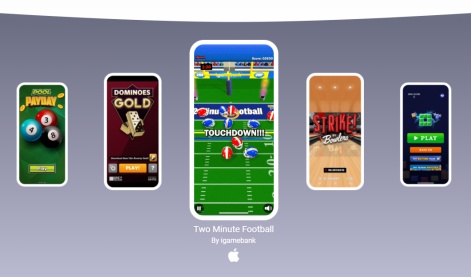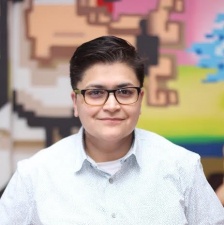March 8th, 2021 is International Women’s Day, an annual celebration of achievements for women all over the world.
In a world that feels so equal, we often hear echoes of ‘women can do everything that men do, why do we need this day?’. While that does ring true thanks to the tireless efforts of those that paved the way, many industries are still not the level playing field that they can and should be, and that includes the global games industry.
With that in mind, our Jobs in Games section this week is dedicated to showcasing incredible women working in the games industry, from all backgrounds and disciplines. We’ll be sharing insight, stories and advice from some of the industry’s most talented women.
Today we're chatting to Miriam Aguirre, chief technology officer at Skillz. Miriam discusses her origins, experience of immigrating to Los Angeles from Mexico, and how encouraging girls to get involved with STEM subjects from a young age will lead to more women in games in the future.
PocketGamer.biz: Firstly, can you tell us about your current role and what it entails?
Miriam Aguirre: As chief technology officer, I oversee the product development organisation at Skillz, outlining the company’s technological vision and implementing strategies to ensure our technology resources are aligned with business goals. My day-to-day work combines my greatest passions of gaming and technology with the ability to drive impactful change and foster a dynamic and diverse work culture.
How did your journey into games begin, and did you always want to work in games?
I discovered my love for gaming as a child in Mexico, where my cousins and I shared an Atari. However, my love of math and science began after immigrating to East LA – which played a critical role in shaping my future. I gravitated toward math because there was no language barrier. It was something I could understand. I watched cartoons and played video games to help teach myself English, but math became the vehicle through which I communicated with my teachers.
I had never considered college as part of my future since no one else in my family had done it. But during my junior year of high school, my AP history teacher encouraged me to apply to universities and helped me to find ways to support my education through grants and scholarships.
I felt very lucky to graduate from MIT with a degree in computer science. I initially thought I would study aerospace engineering because I was fascinated by planes and outer space, but I was encouraged to consider computer science since I was in college near the beginning of the dot-com boom. That decision sparked my love for software engineering and programming.
What do you find are the most common misconceptions, public or professional, about women working in games?
When I was younger, girls weren’t encouraged to pursue studies in STEM or gaming. Without support, a scenario can emerge where many people won’t even try to join the industry. At Skillz, one of my biggest priorities is to foster a diverse and equitable workplace, forging a future where women and members of the POC and LGBTQ+ communities feel not only welcomed but encouraged to join the gaming industry.

Is there anything about the job/industry you wish you would have known when first joining?
I wish I would’ve had more visibility into women working in gaming, and in leadership roles in particular. Having role models to look up to can be a powerful motivator for aspiring professionals. Today, I’m fortunate to be surrounded by people who support me and share a similar vision for the kind of workplace and culture we want to foster.
Do you feel female characters are better represented in video games today, as opposed to when you entered the industry?
At an early age, I noticed that women players were a minority in gaming, and therefore treated differently by fellow players. I even remember using a masculine avatar and non-descriptive username in order to keep the focus on the game rather than the anomaly of me being a woman player. These experiences have strengthened my drive to forge a more inclusive future for the industry. Today, I’ve already seen progress in representation, with many games featuring a variety of primary characters. Additionally, sophisticated customisation engines now make it possible to create any version of a player you want to be!
Can you tell us about some of the biggest challenges you have encountered since joining the industry?
I remember not seeing many people who looked like me in leadership roles, yet no one spoke about it. I wish I knew back then the power of each voice to make a difference.
I remember not seeing many people who looked like me in leadership roles, yet no one spoke about it. I wish I knew back then the power of each voice to make a difference. Once I started to articulate my experiences in the industry, I found I wasn’t alone in my thinking – and it really changed my perspective on what was possible for the future.
This mindset also applies to many worse situations where women have been underpaid, undervalued, and oppressed in the workplace. I know this treatment dates back to even before my time joining the industry, and am glad we can discuss it openly and work toward an even brighter tomorrow. We all have a voice to advocate for equality.
What more can be done to encourage more women to consider a career in games?
Encouraging girls from a young age to consider STEM studies can help to increase their visibility and knowledge of the topics, and even kick start their career journey into the tech or gaming industry.
I also believe it’s critical that companies architect fair hiring and promotion processes that ensure equitability. For instance, at Skillz we’re extremely objective with our hiring and promotion practices, which are firmly anchored on skills and accomplishments. A few examples of how we do this are through assembling a diverse review panel, showcasing transparent feedback, and providing accessibility to career grids.
Diversifying leadership and teams is important – not only in gaming, but across all industries. To that end, we were the first gaming company to take the ParityPledge®, a public commitment to interview at least one qualified woman for every open executive role.
It’s also key for companies to provide opportunities for employees. One example we’ve seen prove successful is the creation of a Diversity, Equity, and Inclusion (DEI) committee composed of employees across all backgrounds, teams, and seniority levels. We have also created other Employee Resource Groups like Women In Tech and ParentZ, host DEI Lunch and Learns, and hold office hours to empower each employee with a space where they belong.
Every company should take a step back and examine what tangible steps they’re taking to support diversity and inclusion, and empower their employees to be part of the conversation.
Any final bits of advice for women looking for a job in this space?
Never underestimate the value of finding a strong support system. It’s important to seek external opinions and speak with peers at other companies. Having a community that supports you is crucial – these people should understand your experiences, but also be able to check you at the same time.
Involve yourself with organisations that empower women to get involved in technical roles. A few that I’ve been involved with and highly respect are Techqueria, Women Who Code, Girl Develop It, and Technovation.
Work on projects you’re passionate about. Explore stretch opportunities, and recognise the type of impact you want to make on a team or within a company – knowing that this can look different for every person. As a parent, I know that I need to speak up in order to propel the next generation forward and pave the path for aspiring women in tech and gaming.
Finally, don’t be afraid to fail. We cannot stay in the same place, doing the same things, and expect to grow. Taking risks and learning from mistakes can provide some of the most rewarding lessons.





















